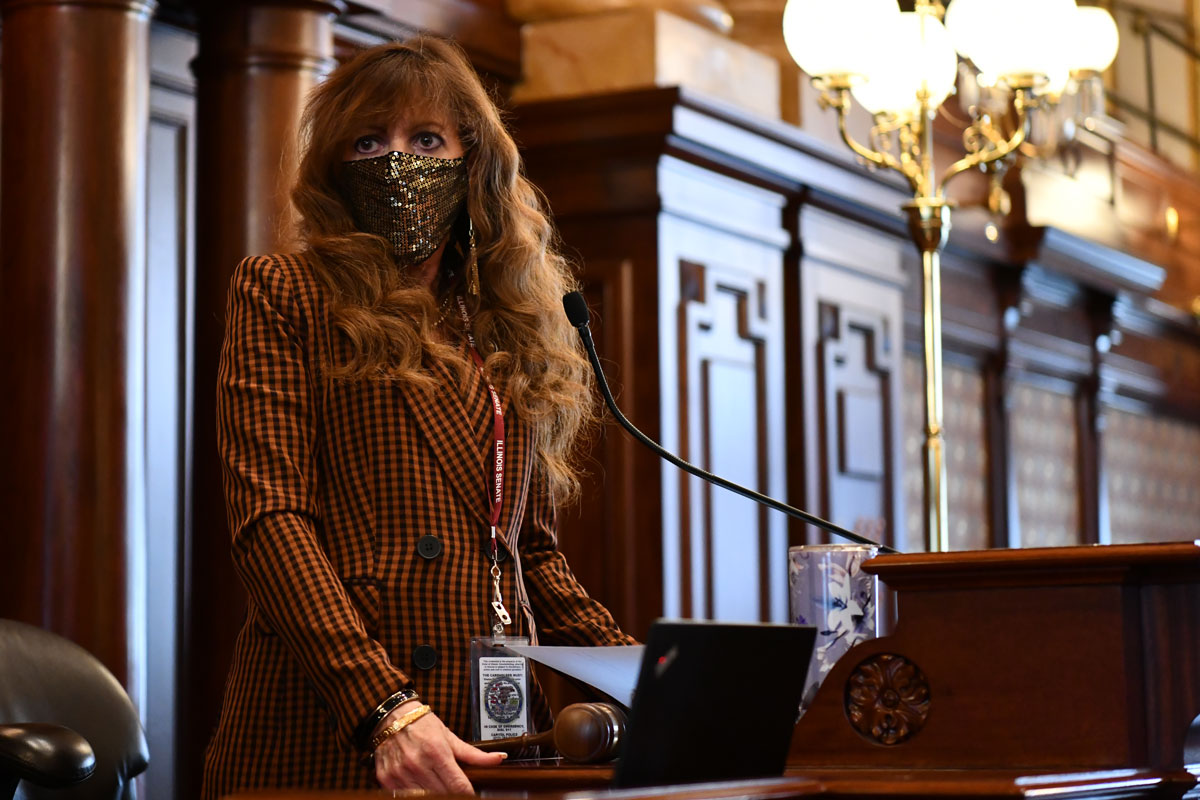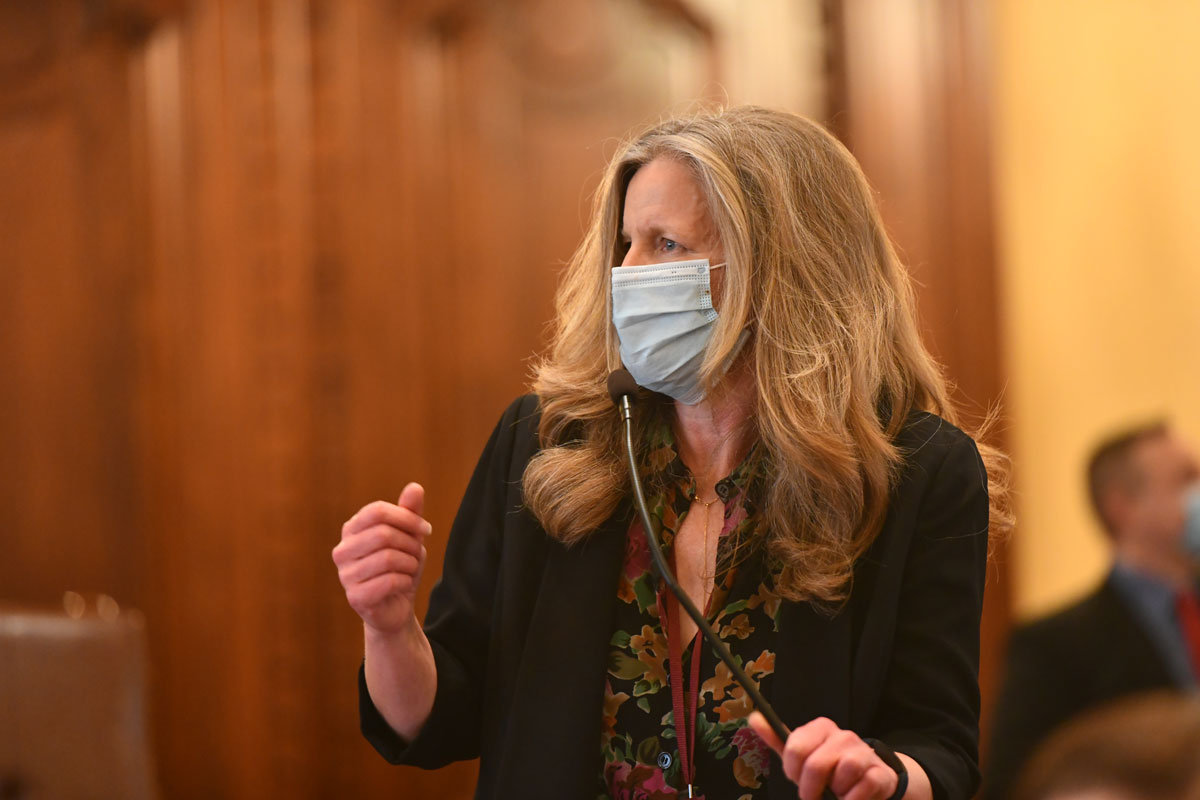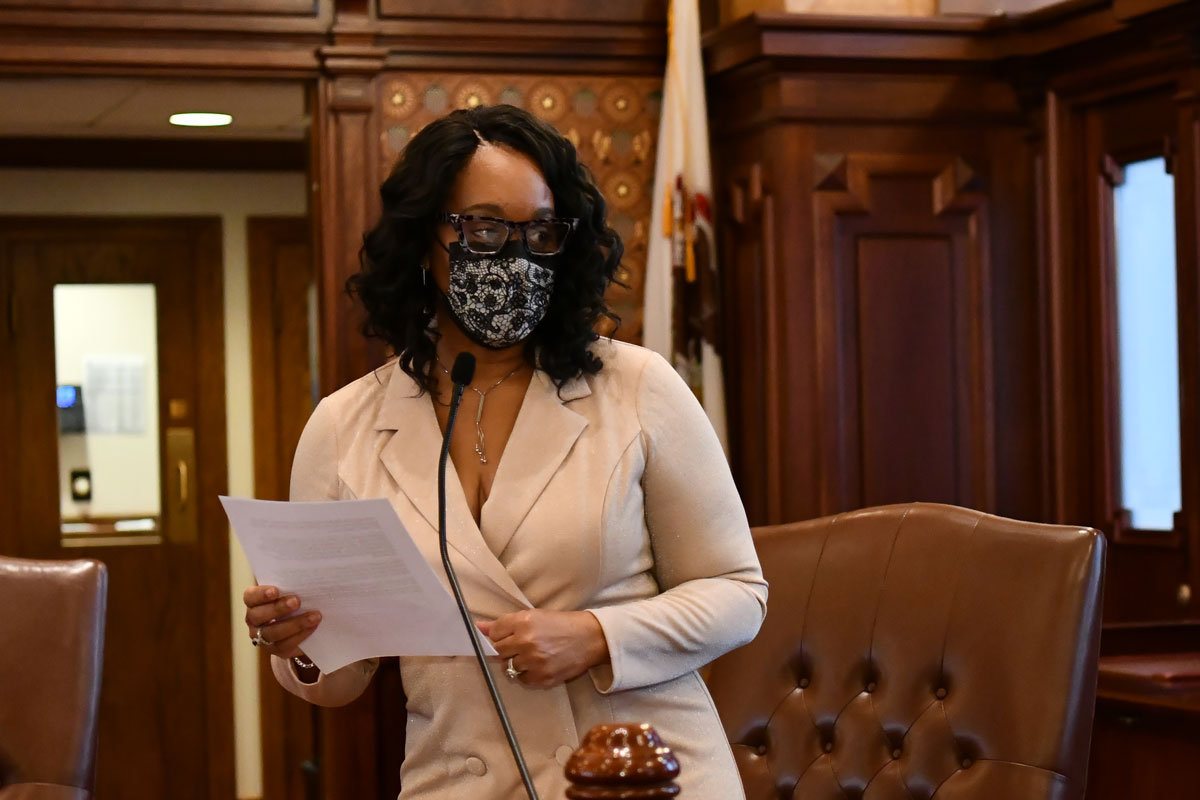- Details
- Category: Senator Linda Holmes News
 SPRINGFIELD – Prior authorization is a health insurance company practice meant to ensure treatments are medically necessary, but it often forces patients to wait too long for treatments they need. House Bill 711, sponsored by State Senator Linda Holmes (D-Aurora) to rein in that practice, passed the Senate Insurance Committee on Wednesday.
SPRINGFIELD – Prior authorization is a health insurance company practice meant to ensure treatments are medically necessary, but it often forces patients to wait too long for treatments they need. House Bill 711, sponsored by State Senator Linda Holmes (D-Aurora) to rein in that practice, passed the Senate Insurance Committee on Wednesday.
“People requiring surgery, supplies or services often experience stressful delays as they await approval for medical treatment, and it is past time to shorten and simplify that process,” Holmes said. “For those with chronic or life-threatening conditions, it can be an ongoing battle for however long the treatment continues.”
The Prior Authorization Reform Act would create a system that requires transparency, appropriate peer-to-peer review, medically appropriate timelines for both urgent and non-urgent care, and continuity of care. If authorization is approved for a given treatment, related supplies or services would also be considered to be authorized, and the approval would remain in effect for the extent of the care.
Read more: Senator Holmes moves to reform prior authorization practices by health insurers
- Details
- Category: Senator Ann Gillespie News
 SPRINGFIELD – To ensure that tax increment financing (TIF) dollars are used responsibly, State Senator Ann Gillespie passed legislation in the Senate Revenue Committee that would expand the required reporting by municipalities to the Illinois Comptroller.
SPRINGFIELD – To ensure that tax increment financing (TIF) dollars are used responsibly, State Senator Ann Gillespie passed legislation in the Senate Revenue Committee that would expand the required reporting by municipalities to the Illinois Comptroller.
“Most residents don’t know how TIF districts affect their property taxes or benefit the community,” Gillespie said. “This plan will shed light on the process and provide transparency in our local governments.”
TIF districts are a tool used by municipal governments to stimulate economic development in targeted areas. The legislation would gather more consistent, measurable data on the success of the TIF project by expanding what local governments must report annually to the Comptroller’s Office. Expanded reporting requirements would include projected and actual job creation, and projected and actual increment. The legislation also requires the report to be verified by a neutral third party.
"This is a sensible plan to ensure taxpayers are presented with a more complete picture of whether promises made are promises kept when it comes to TIF districts in their communities," Illinois State Comptroller Susana Mendoza said.
House Bill 571 passed the Senate Revenue Committee and awaits consideration before the full Senate.
- Details
- Category: Senator Scott Bennett News
 CHAMPAIGN – May is Foster Parent Appreciation Month, and State Senator Scott Bennett (D-Champaign) is extending his appreciation to those who help enhance the lives of children and youth in foster care, as well as encouraging community members to consider becoming a foster parent.
CHAMPAIGN – May is Foster Parent Appreciation Month, and State Senator Scott Bennett (D-Champaign) is extending his appreciation to those who help enhance the lives of children and youth in foster care, as well as encouraging community members to consider becoming a foster parent.
“May is a great time to recognize the role foster parents play by providing safe havens and stable homes for our youth in need,” Bennett said. “Please take a moment to thank the foster families in our community for a job well done and consider making the commitment yourself to foster a child in need.”
Today, there are just over 21,000 youth living in foster care in the state. Of that number, 8,200 are living with foster families, 11,300 with relatives, and 1,200 in group homes and institutions. The need for foster parents is growing, and there are many types of foster care, including traditional care, emergency/shelter care, medical/therapeutic care, relative/kinship care, respite/short-term care, and tribal care.
Foster parents must be at least 21 years old and can be married, in a civil union, single, divorced or separated. They can work full- or part-time, go to school, or be a stay-at-home parent, and can rent or own their own home.
“By opening their hearts and homes, foster parents give vulnerable children the stability and connections to community, friends and family members they need to thrive,” said Illinois DCFS Acting Director Marc D. Smith. “They are an invaluable part of the child welfare team; and we could not do the work of keeping children safe without them.”
Currently, foster homes are needed for sibling groups, adolescents, African American and Latino youth, children with special medical needs, teenage mothers and their babies, and LGBTQI (lesbian, gay, bisexual, transgender, questioning, intersex) youth. A complete list of youth in need of foster families can be found at the Heart Gallery of Illinois website.
To learn more about becoming a licensed foster parent, fill out the online interest form on the DCFS website. Click on Loving Homes, then click on Become a Foster or Adoptive Parent.
- Details
- Category: Senator Laura Ellman News
 SPRINGFIELD – A measure sponsored by State Senator Laura Ellman (D-Naperville) that would allow students to use 529 college savings accounts for additional purposes without additional taxation passed committee on Wednesday.
SPRINGFIELD – A measure sponsored by State Senator Laura Ellman (D-Naperville) that would allow students to use 529 college savings accounts for additional purposes without additional taxation passed committee on Wednesday.
“This measure expands the uses of college savings plans to better reflect the realities of higher education,” Ellman said. “Some students need to use their savings plans to pay for loans or job-training programs.”
The measure would allow up to $10,000 to be used for additional education-related purposes without being taxed, making Illinois law consistent with federal law.
The additional education-related purposes are:
- Interest payments on the student’s qualified education loan, and
- To cover expenses for fees, text books, supplies and other materials needed to participate in certain vocational apprenticeship programs registered and certified with the secretary of labor.
“Every resident of Illinois deserves the chance to succeed and decide their future,” Ellman said. “Broadening the uses of this savings program gives our young people more options.”
House Bill 741 passed the Senate Financial Institutions Committee without opposition and now heads to the Senate floor for further consideration.
- Details
- Category: Majority Report
Black Caucus celebrates success of year-long effort to dismantle systemic racism in Illinois
Though the work of fully implementing the laws will take years – perhaps decades – the Illinois Legislative Black Caucus’ year-long effort to cleanse Illinois’ government systems of racism is officially the law of the land. The fourth and final pillar of their agenda – health care and human services – was signed by the governor in late April.
When George Floyd’s murder at the hands of a Minneapolis police officer sparked worldwide protests, Senate Majority Leader Kimberly A. Lightford (D-Maywood) – who was chair of the Black Caucus – called together her colleagues to take advantage of that anger and energy to enact real change.
Turner's plan to expand agricultural education for students passes Senate
SPRINGFIELD – State Senator Doris Turner’s (D-Springfield) effort to make agricultural sciences courses count toward Illinois university admissions requirements passed the Senate.
“The goal here is to highlight the importance of agricultural studies,” said Turner. “Our current curricula did not reflect that by excluding it from courses that count toward the three required years of sciences, and may have deterred some students from pursuing those studies.”
Lightford seeks to create new mentoring program for teachers and principals
SPRINGFIELD – In effort to support new employees of Illinois’ educational system, Senate Majority Leader Kimberly A. Lightford (D-Maywood) is working to create a New Teacher Induction and Mentoring Program and a New Principal Mentoring Program.
“Ensuring all new educators receive support while developing essential knowledge, skills, and experience will result in a high-quality education for all students,” Lightford said. “A mentoring program would be a great way to build our new educators’ confidence and teaching strategies, helping create a great learning environment and experience for Illinois’ diverse learners.”
Cunningham legislation would protect accident victims
SPRINGFIELD – Senator Bill Cunningham passed legislation out of the Illinois Senate requiring insurance companies to fully cover the cost of replacing a vehicle that is totaled in an accident.
Under current Illinois law, insurance companies do not have to pay certain taxes and fees for purchase of a replacement vehicle, saddling accident victims with hundreds and sometimes thousands of dollars in unanticipated costs — even when they were not at fault in the auto accident.
“If an insurance company covers the cost of replacing your totaled vehicle, they should pay all the costs,” said Cunningham, a Democrat who represents portions of Chicago and the southwest suburbs. “It’s not fair to tell an accident victim that you’re going to replace their vehicle and then slap them with big taxes and fees.”
Draw your own map portal available
The Illinois Senate Democratic Caucus has an online portal that allows the public to draw and submit proposed legislative boundaries. The move builds on the commitment of Democrats to engage in a redistricting process that is transparent and fair, encouraging input from communities across the state as legislators work to draft a fair map that reflects the diversity of Illinois.
The portal presents the first time in Illinois history that the public can go online to craft proposed maps, allowing for greater access and public participation in the once-a-decade redistricting process. All maps submitted through the portal will be reviewed as part of the public record. The portal can be accessed online day or night at ilsenateredistricting.com.

In case you missed it
MEMBERS IN THE NEWS
Senator Mattie Hunter, Chicago: Pritzker signs expansive health care access, equity proposal | The Washington Post
Senator Meg Loughran Cappel, Plainfield: Children to be considered when sentencing mothers | The Times Weekly
Senator Rob Martwick, Chicago: Bills would allow lawmakers to meet, vote remotely | Lincoln Courier
Senator Celina Villanueva, Chicago: Villanueva Passes Legislation to Create Domestic Violence Commission | Lawndale News
Copyright 2021 - Illinois Senate Democratic Caucus - All Rights Reserved
- Details
- Category: Senator Steve Stadelman News
 SPRINGFIELD – State agencies and institutions could only purchase American and Illinois flags manufactured in the United States under a measure sponsored by State Senator Steve Stadelman (D-Rockford) that passed committee Wednesday.
SPRINGFIELD – State agencies and institutions could only purchase American and Illinois flags manufactured in the United States under a measure sponsored by State Senator Steve Stadelman (D-Rockford) that passed committee Wednesday.
“This is the right thing to do. As a government, we have no business flying our state and nation’s flags if they aren’t made in America,” Stadelman said. “Supporting our local businesses and economies should always take priority.”
Read more: Stadelman: Flying American-made flags is the right thing to do
- Details
- Category: Senator Robert Peters News
 SPRINGFIELD – State Senator Robert Peters (D-Chicago) is continuing an effort to decriminalize the transmission of human immunodeficiency virus.
SPRINGFIELD – State Senator Robert Peters (D-Chicago) is continuing an effort to decriminalize the transmission of human immunodeficiency virus.
“Having HIV is a health care concern, not a crime,” Peters said. “People living with HIV don’t need to worry about facing criminal charges for simply living.”
Read more: Peters advances legislation that would decriminalize HIV transmission
- Details
- Category: Senator Adriane Johnson News
 SPRINGFIELD – As Muslims worldwide observe Ramadan—a month of fasting, prayer, reflection and community—State Senator Adriane Johnson (D-Buffalo Grove) wants to ensure kids of every background can take part in cultural traditions without risking their health.
SPRINGFIELD – As Muslims worldwide observe Ramadan—a month of fasting, prayer, reflection and community—State Senator Adriane Johnson (D-Buffalo Grove) wants to ensure kids of every background can take part in cultural traditions without risking their health.
“Fasting is a common practice not just in the Muslim religion, but also in Buddhism, Christianity, Judaism, Hinduism and more,” Johnson said. “Especially for kids and teens, fasting can make people feel hungry, unfocused or even physically weak. It’s important that schools are sensitive to students’ needs when they might not be operating at full capacity.”
The legislation would allow students who are fasting for religious purposes to be excused from physical education activities for the duration of the religious fasting period, if the student’s parents have sent in written notification to the school principal.
During the month of Ramadan, Muslims fast every day from sunrise to sunset as a form of spiritual discipline. Jewish people traditionally observe Yom Kippur, the holiest day of the year in Judaism, with a day-long fast and intensive prayer, and several Christian denominations practice full or partial fasting on certain occasions, including during Lent.
Fasting can cause dizziness, fatigue, headaches and dehydration, which may lead to weakness or fainting, especially during exercise.
“This is about our children’s health, safety and well-being,” Johnson said. “Every child, regardless of their background, deserves to feel comfortable at school.”
House Bill 160 passed the Senate Education Committee Tuesday. The measure was originally introduced in the House of Representatives by Rep. Daniel Didech (D-Buffalo Grove).
More Articles …
Page 500 of 768


















 © 2026 Illinois Senate Democratic Caucus
© 2026 Illinois Senate Democratic Caucus